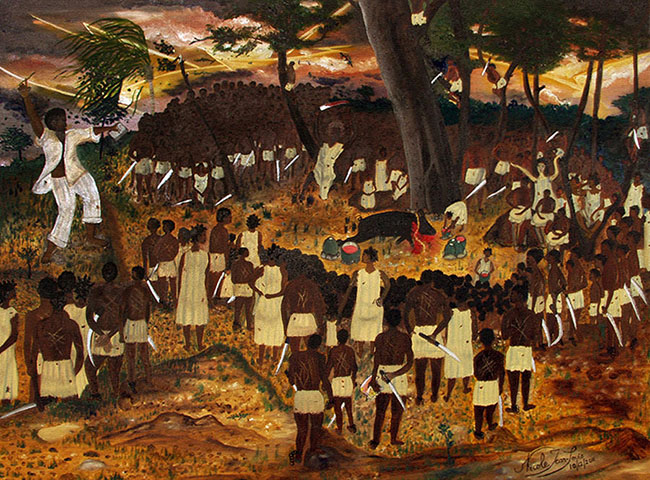This post is also available in: Kreyol
“The 12 principles of Bwa Kayiman was an answer that came to me…”
Professor Pierre Michel Chery
The Bwa Kayiman ceremony that took place in the North of what is now Haiti on August 14, 1791 was a critical event in Haiti’s history. It was held by enslaved Haitians to launch the revolution against slavery and French colonialism, and consisted of a Vodou ceremony and a political meeting. We know that resistance against slavery happened consistently in the daily lives of our ancestors and a number of rebellions took place long before 1791. What sets Bwa Kayiman apart from other collective acts of resistance in Saint Dominique is that it was a planning meeting and religious ceremony that included a solemn vow by those who participated to be free or die fighting for it. Beyond its importance in terms of strategy, it’s one moment in Haitian history from which the collective Haitian imagination to become a nation is drawn, and it is regularly referred to in times of political struggle in present day Haiti.
Despite Bwa Kayiman’s importance in the creation of the Haitian nation, the date and the place have not been elevated by the Haitian state as an official holiday. In a recent lecture on how the Haitian state and civil society has built sites of heritage and collective memory around our history, Haitian Art historian Carlos Celius, described and analyzed that aspect of Haitian identity formulation. Celius explains that the Haitian state has promoted the importance of forts and commemorated dates of battles as national holidays. Bwa Kayiman is simply not elevated to the status of other historic symbols of our independence. August 14th is not a national holiday and it remains a contested site because of its association with Vodou.
Professor Pierre Michel Chery proposed the 12 Prensip Bwa Kayiman, a set of values associated with Bwa Kayiman. People who study Haiti often make reference to them, particularly the first one – Tout Moun Se Moun: Pa gen Moun pase Moun. We had a chance to talk to Professor Chery to understand where the principles come from. Below is a transcription of our conversation with him with some changes for clarity.
Why did you propose the 12 principles of Bwa Kayiman?
The 12 principles of Bwa Kayiman was an answer that came to me in a sense. It came to me in a very particular context in the country in 2009. At the time there was a Protestant pastor who was undertaking a kwazad that centered on demonizing Bwa Kayiman and Cecil Fatima as Jezabel. The event was widely broadcasted by the media and he held it in a large open space with large screens outside so that even passersby could tune in.
What shocked me about this week-long kwazad was how the pastor treated someone like Cecil Fatima and Bwa Kayiman. Bwa Kayiman is a part of the founding of Haiti. I was shocked that no intellectual, not one ethnographer, nor anthropologist had responded to such a negative discourse on the very foundation of Haitian society.
This indifference from the intellectual community was unacceptable. It felt like an interpellation. There is a saying that goes, if you notice that there’s something to be done and there’s no one else to do it, you should do it yourself.
From there, I had already been exploring subject matter pertaining to what makes the strength of the Haitian peasantry. That same night, I drew from this work and was able to find the links between the life philosophies of the Haitian peasantry and the 12 principles of Bwa Kayiman.

What methodology did you use to pick the 12 principles that you chose?
The methodology was largely observational. I did not immerse myself but observed, collected data and then went off to interpret these observations. That said, I am part of the peasantry myself and know their habits. When you ask them questions, they assess you and will give you an answer based on their assessment of you – what you look like to them.
My interest peaked on the subject after hearing a person from the peasantry say, “Depi m gen manje pou m manje” – boiling life and necessities down to the issue of food which is all about survival. That means, a Haitian peasant is a person – and all of Haitian history supports this – who is prepared to live with the absolute minimum of what is vital for survival. We have to add to this minimum, because it cannot stay at the level of food. It has to be brought to the level of what a Haitian person needs to live.
This distinction highlights a major difference between a capitalist society where people need to make money, and a society where people just want to make it through life with the minimum of what life has to offer them, without the need for accumulation. This was the first aspect of my work.
From there we essentially discover that the philosophy of the peasantry should be associated with Bwa Kayiman because it can make the difference for us as a society, for us as an existence project if you will.
Which principle do you think would be helpful to get the country out of this crisis?
Veye! Lènmi Bwa Kayiman ap vin sou tout kalite non, ak tout kalite rechany ... Watch out! The Bwa Kayiman’s enemies will come under all types of names, in all types of clothing…
12 Prensip Bwa Kayiman
Based on my experience, everyone who reads the principles, likes and integrates them, finds one principle that becomes fundamental to them. There are people who like the principle “Pa Lage Chay Nan Men Manfouben” and live by it. One ethnographer friend of mine told me he does not make any important decisions without consulting this principle. Another says “Chak Moun Gen Fason Pa Li Pou Li Lapriyè” led her to accept her calling as a manbo and now she is one of the most powerful manbos in the country. They speak to people based on their journey.
Now if I were to choose which principles would help us out of this crisis, they would be the very first principle, ”Pa Gen Moun Pase Moun” and the principle that goes with it “Si Gen Pou Youn Gen Pou De”. They are fundamental to Haitian life. And, all of the difficulties we live come out of the contradictions that exist with the ”Pa Gen Moun Pase Moun” principle and the apartheid society that emerged from colonization.
To understand this apartheid society, we must square the principles of Bwa Kayiman with Article 59 of the 1685 Code noir. This article concerns the free blacks who began fighting to change the system before the revolt. They were fighting for their interest, so that they could have the same rights as the whites using Article 59.
It was on the basis of this Article that they were fighting and it is with it that they were making their demands to the French. In that same article, they did not see the question of liberty for all. And that’s where Bwa Kayiman comes in.
It offered liberty for all, and established the principle of ”Pa Gen Moun Pase Moun”. Meaning a white person cannot be superior to a black person. What makes you a person is what you have inside and what you contribute to life, not the color of your skin. These two principles are fundamental and you will find political organizations that have adopted these principles as slogans. Particularly the former. And with these principles we can build another society where we have a state that considers the needs of all citizens in the country, with respect for one another and in consideration of “Chak Moun Gen Fason Pa Li Pou Li Lapriyè”.
12 Prensip Bwa Kayiman
- Tout moun se moun. Pa gen moun pase moun. All people are human. No person is better than another (or is more human than another).
- Tout moun gen plas yo anba syèl ble a. Everyone has their place under the blue sky.
- Si gen pou youn gen pou de. If there is enough for one, there is enough for two.
- Chak moun gen fason pa li pou li lapriyè. Respekte fason chak moun lapriyè… Everyone has their own way to pray. Respect how everyone prays.
- Sa nou pa konnen pi gran pase nou. What we do not know is greater than us.
- Nan pwen anyen nan lavi a ki pa gen règleman. Se règleman ki bay lavi a ekilib. There is nothing in life without a law. Law gives life balance.
- Pa defèt ekilib lavi a san rezon. Moun, ki mal deplase eleman yo, ap rale malè sou tout moun. Do not displace life’s balance without reason.
- Tank n ap aprann, se tank n ap konnen kòman pou nou respekte ekilib lavi a. The more we learn, the more we will understand how to respect life’s balance.
- Pa janm manje manje bliye. Never forget things easily.
- Toujou sonje: fè koupe fè; dèyè mòn gen mòn; pa fè san inosan koule; pa lage chay nan men manfouben. Always remember: no matter how tough you are, there is always someone tougher; there are more mountains behind mountains; do not shed the blood of innocents; do not have careless people bear responsibility.
- Veye! Lènmi Bwa Kayiman ap vin sou tout kalite non, ak tout kalite rechany pou yo tire revany. Watch out! The Bwa Kayiman’s enemies will come under all types of names, in all types of clothing for revenge.
- Malè yon eritye ki bliye esklav fè Bwa Kayiman pou moun k ap sèvi Bondye pa lote moun nan mitan bèt. Shame on the heir who forgets that slaves made Bwa Kayiman so that people who are serving God may may never again be put in packs among animals.
Featured Images: The Black Atlantic Principle translations: Potomitan.info
